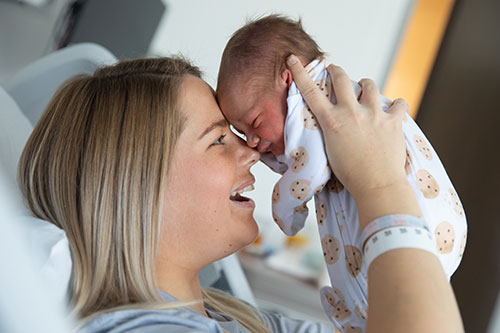Support throughout your breastfeeding experience
Our breastfeeding program is designed to help you and your infant throughout the breastfeeding experience by providing the emotional support and tools you need to be successful in breastfeeding. Families have access to onsite lactation consultants, increased breastfeeding education resources and appointments available in a breastfeeding-friendly office.
I'm Pregnant

- I want to learn about options for feeding my baby.
- Call 717-531-MILK (6455) to speak with a breastfeeding specialist. We will respond to all messages during normal business hours.
- I’m looking for breastfeeding classes.
- Review a full list of our educational classes.
- I’m not sure I can breastfeed due to my medical condition.
- Call 717-531-MILK (6455) to speak with a breastfeeding specialist. We will respond to all messages during normal business hours.
- I have concerns about taking medication while breastfeeding.
- Most medications are safe for breastfeeding. For more information, visit LactMed.
I've Had My Baby

- I have concerns about taking medication while breastfeeding.
- Most medications are safe for breastfeeding. For more information, visit LactMed.
- I want to talk with a breastfeeding specialist.
- Call 717-531-MILK (6455) to speak with a breastfeeding specialist. We will respond to all messages during normal business hours.
- I need one-on-one help with breastfeeding concerns.
- Call 717-531-6455 (calls returned during normal business hours) to schedule an appointment with a breastfeeding specialist for:
- Nipple pain
- Latching difficulty
- Engorgement
- Low supply
- Oversupply
- Plugged ducts
- Returning to work
- Multiples
- Pumping
- Infant breast refusal or biting
- Other concerns not listed
- Call 717-531-6455 (calls returned during normal business hours) to schedule an appointment with a breastfeeding specialist for:
- I’m looking for a support group.
- View a list of our support groups.
I Have Other Questions

- I need information about donating breast milk.
- Contact Mid-Atlantic Mothers’ Milk Bank
- I’m interested in alternative feeding options for my situation.
- Call 717-531-MILK (6455) to speak with a breastfeeding specialist. We will respond to all messages during normal business hours.
- I am undergoing treatment that requires a change to my breastfeeding plan and need guidance.
- Call 717-531-MILK (6455) to speak with a breastfeeding specialist. We will respond to all messages during normal business hours.
- I have a medical condition that requires me to stop breastfeeding and need guidance.
- Call 717-531-MILK (6455) to speak with a breastfeeding specialist. We will respond to all messages during normal business hours.
- I am dealing with the loss of my baby and want to know what to expect with lactation.
- Call 717-531-MILK (6455) to speak with a breastfeeding specialist or visit the Mid-Atlantic Mothers’ Milk Bank website.
Clinic location and appointments
The Breastfeeding Medicine Program is located in five locations:
- Penn State Health Children's Heart Group
- Penn State Health Family Medical Group - Nyes Road
- Penn State Health Pediatrics
- Penn State Health Pediatric Specialties
Appointments are available Monday-Friday, 8 a.m. - 4 p.m. and may be scheduled by calling 717-531-MILK (6455). Appointments may be scheduled in coordination with other women’s health or pediatric appointments when available. The breastfeeding program is available to any mother or infant in our community, regardless of where they receive primary care.
Additional Support
Additional breastfeeding support is available to mothers, family members and referring providers through the Breastfeeding Resource Line at 717-531-MILK (6455). Call anytime day or night. We will respond to all messages during normal business hours.
For urgent concerns, call your provider or visit the emergency department.
Discover a full list of the educational classes and support groups we offer to breastfeeding mothers.
Insurance coverage
Medical assistance insurance companies (such as Highmark Wholecare, Aetna and others) cover lactation consultant services completely. Many other insurance companies also provide coverage for this service. Please check with your insurance company to confirm your coverage. Mention code 8698960 when asking the insurance company about coverage.
Links
- Natural Breastfeeding for an Easier Start
- Breastfeeding and Antibiotic Stewardship by Nicole Hackman, MD
- La Leche League
- Breastfeeding and Medication Safety:
- InfantRisk Center
- PA Department of Health: Pennsylvania Breastfeeding Awareness and Support Program
- The Medical Minute: Proper support can lead to breastfeeding success
Breast pumps
The Affordable Care Act (ACA), which was signed into law in 2010, requires health plans to cover breastfeeding support and supplies. Every health plan is different, so it is important to contact them and get the following information:
- Does my policy provide coverage for a breast pump?
- What type of breast pump does it cover?
- Medical equipment requires insurance codes. Use the code when asking which pump is covered:
- Manual (hand) breast pump (E0602)
- Personal-use double electric breast pump (E0603) *Many patients prefer this type.
- “Hospital-grade” rental pump (E0604) * Not usually covered by insurance.
- Medical equipment requires insurance codes. Use the code when asking which pump is covered:
- Which durable medical equipment (DME) companies participate with my insurance? Insurance companies require you to obtain your breast pump through a participating DME. Not all DMEs carry breast pumps.
- Name of company
- Phone number
- Fax number
Here are some local resources that carry breast pumps:
- WellSpan Medical Equipment
- 717-272-2057 (Lebanon)
- 717-721-4299 (Ephrata)
- Adapthealth/Storkpump
You may need a prescription from your health care provider for a breast pump.
Ask the provider to include the following information on the prescription. Without this information the insurance company may deny coverage.
- Diagnosis code: Z39.1 (lactating mother)
- Procedure code: E0603 (personal use double electric pump), E0602 (hand pump), E0604 (hospital-grade rental) *Most likely self-pay
- Contact the DME company, request your breast pump and ask how to obtain it. You may be required to upload the prescription, if the breast pump will be shipped directly to your home. Otherwise, present the prescription when you pick up the breast pump.
Information about breast pumps
A personal-use breast pump is designed to help a mother maintain her milk production after it is established and when she is separated from her infant, such as when a mother returns to work. This type of pump is not meant to be reused with a future baby or shared with another mother due to the risk of infection and motor failure.
A hospital-grade breast pump is designed to assist a new mother with starting and establishing her breast milk supply when the infant is unable to breastfeed, is breastfeeding ineffectively or the mother and infant are separated, such as when the baby is in the neonatal intensive care unit. The programmed pumping patterns are designed to stimulate milk production and empty the breast more effectively than a personal use pump.
Hospital-grade breast pumps are expensive ($2,000 or more) because of the quality of the motor, which typically makes them available only for rental. Currently, most insurances do not cover the rental of a hospital-grade breast pump, which can range from $90 to $100 per month or more, requiring out-of-pocket payment.
If you have used a hospital-grade breast pump during your hospital stay, your breast pump kit can be used on a rental breast pump. You can obtain a rental pump from:
- Storkpump
- WellSpan Medical Equipment (Ephrata)
- Special Supplemental Nutritional Program for Women, Infants and Children (WIC): some offices provide a Symphony pump on loan according to need
Call for availability and to reserve a breast pump prior to pickup.
Children’s Miracle Network support
Funding for the Breastfeeding Program is provided, in part, by Children’s Miracle Network Hospitals® (CMNH). CMNH has provided breast pumps, specialty breastfeeding chairs and funding for a lactation consultant. To learn more about Children’s Miracle Network at Penn State Health Golisano Children’s Hospital, visit CMNHershey.org.


